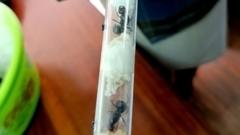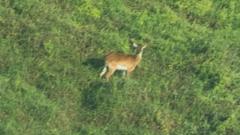In a groundbreaking case, four individuals have pled guilty in Kenya for attempting to smuggle rare ants, including the giant African harvester ant, emphasizing a disturbing shift in wildlife trafficking toward lesser-known species crucial for ecological balance.
Kenya's Landmark Ant Smuggling Case Highlights Growing Threat to Biodiversity

Kenya's Landmark Ant Smuggling Case Highlights Growing Threat to Biodiversity
Four men caught attempting to smuggle hundreds of rare ants, revealing alarming trends in wildlife trafficking.
In a significant development concerning wildlife trafficking, four men have confessed to attempting to smuggle hundreds of highly coveted ants out of Kenya. The Kenya Wildlife Service (KWS) has labeled this incident as a "landmark case," showcasing a growing concern over the illegal trade of less-visible, yet vital species. Typically known for efforts to protect iconic mammals like lions and elephants, the KWS has turned its attention towards these unusual contraband items that may be equally important for the ecosystem.
Among the seized insects were the giant African harvester ants, valued by some dealers in the UK at up to £170 ($220) each. This case is indicative of a troubling trend in wildlife trafficking: a shift from the more commonly targeted charismatic animals to lesser-known species that play crucial roles in sustaining ecological balance. The contraband ants were cleverly hidden inside specially modified test tubes and syringes designed to prolong their survival for up to two months, indicating a calculated effort to evade detection by security personnel.
The illicit haul, depicted in KWS photographs, features countless test tubes stuffed with cotton wool, each containing two or three live ants. These insects were reportedly headed to exotic pet markets in Europe and Asia, as the interest in rare insect species continues to grow. The giant African harvester ant (Messor cephalotes) is noted for its impressive size, with individuals reaching up to 20mm long, while queens can grow to 25mm.
Pat Stanchev, the general manager of a UK insect-dealing website, acknowledged that the ants' size and beauty make them appealing to collectors, although he does not sell this specific species. The KWS has revealed that the men involved—two Belgians, a Vietnamese, and a Kenyan—were apprehended during a coordinated intelligence-driven operation. As the investigation unfolds, the authorities are still assessing the total number of ants in question.
In Kenya, trade in these ants is strictly regulated under international biodiversity treaties, and this prosecution sends a firm message that the country is committed to tackling unconventional wildlife crimes. The sentencing for the four suspects is scheduled for Tuesday, marking a pivotal moment in the ongoing struggle against wildlife trafficking and illegal bio-piracy in the region.




















